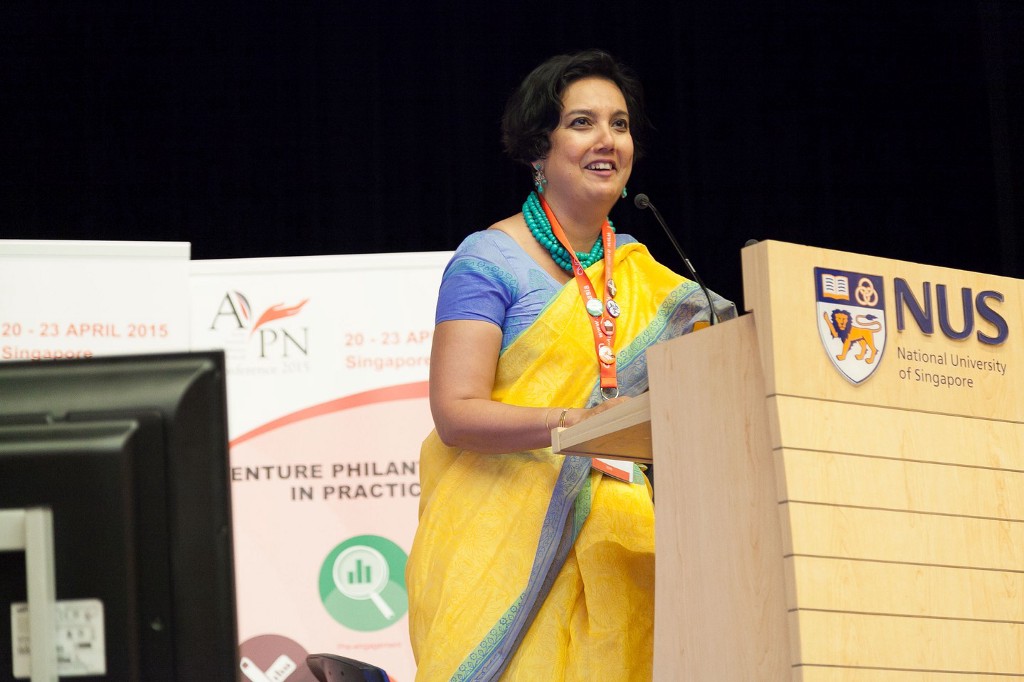People with more than a passing interest in venture philanthropy and impact investing will meet in Bangkok next week for the Asian Venture Philanthropy Network’s 2017 Conference, June 7-9.
ImpactAlpha is a media sponsor of the event. We caught up briefly with Naina Batra, CEO of the network, who shared a few things we thought you should know about the social (impact) scene in Asia:
Momentum is building
It’s predictably tough to characterize Asia with one sweeping statement. Yet across the diverse economies, impact ecosystems and cultures, the whole region is feeling the momentum and growing appetite for more investment in social businesses.
India and China are the behemoths. India’s story is well known, from its long association with inclusive finance and businesses, to its established private equity markets and its coterie of international impact investors. China’s newfound wealth, from Jack Ma to the next generation of the super super rich, represents a new wave.
Korea’s public sector has been very active promoting social entrepreneurship. Japan’s scene is lively as well and both countries are active in supporting development across the region.
The pipeline of investable opportunities — whether market rate or not — is small but growing in Indonesia, the Philippines, Thailand and Vietnam.
Korea has a success story
If there’s a poster-child among social-impact startups, it may be Tree Planet, a Korean gaming company that encourages the planting of trees. Tree Planet has successfully jumped from startup social business (it was seeded by Crevisse, a high-touch social impact accelerator in Korea) to Series A funding from Silicon Valley.
Inflated expectations are the elephant at the cocktail party
The next generation of High Net Worth families from China and elsewhere in the region may place too much faith in the existence of social unicorns. Most deals, in the $2 to 5 million range, remain small. The Chinese market has flattened or decreased over the past two years.
The regional focus has been on financial inclusion — with much less happening on other themes like education and health. The involvement of leading figures will continue to stimulate interest, education and opportunities.
Laws must evolve
Whether they’re going for the big bucks or not, social businesses live in a legal netherland where social purpose and financial objectives struggle to converge. Legal frameworks are slow to catch up to newer realities and generally set clear distinctions between businesses and charities.
Entrepreneurs are then forced to choose one over the other, and repeat that choice again with every new country then want to enter. The cost: it slows down scaling. This is particularly true for entrepreneurs coming from the (relatively) smaller countries and whose business needs to expand abroad to thrive.
Innovate and replicate
Among investors, large grantmakers are moving away from vanilla grants and starting to use debt instruments and exploring hybrid debt/equity vehicles. The Nippon Foundation, Japan’s largest grantmaker, is embracing venture philanthropy approaches and taking a leap forward. That is helping others in the region follow suit.
An emerging idea for collaboration across different types of actors is taking hold.The Malaysian Collective Impact Initiative for Education, for example, has brought together eleven organizations including corporates, family offices and more. Anchored by Credit Suisse, the initiative brings different stakeholders to the table to focus on improved educational outcomes.
What’s next?
AVPN’s Batra hopes the specific examples inspire others to follow suit, learn what’s happening and meet with fellow dealmakers. Learn, invest, innovate and repeat (with a dash of evolving legal frameworks) can help markets grow and create many more vibrant and commercial opportunities. Watch this space: ImpactAlpha will be reporting from Bangkok.











